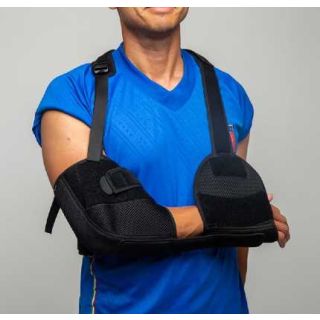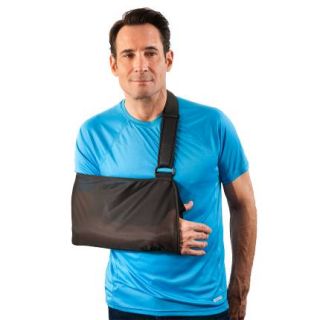-
 Details$77.99 $71.99
Details$77.99 $71.99 -
 Details$23.99 $16.99
Details$23.99 $16.99 -
 Details$32.99 $24.49
Details$32.99 $24.49 -
 Details$21.99 $18.99
Details$21.99 $18.99 -
Sale - Limited Time

-
 Details$54.99 $45.26
Details$54.99 $45.26 -
 Details$17.00 $17.00
Details$17.00 $17.00 -
 Details$22.99 $18.99
Details$22.99 $18.99 -
 Details$21.99 $18.79
Details$21.99 $18.79 -
 Details$96.00 $96.00
Details$96.00 $96.00 -
 Details$16.50 $15.95
Details$16.50 $15.95 -
 Details$22.95 $11.45
Details$22.95 $11.45
How To Choose The Right Shoulder Brace
When selecting a shoulder brace, it’s important to make sure your choice of brace aligns your injury and/or unique requirements. Here are some important considerations to keep in mind:
1. Type of Injury or Condition: Tailor the choice to the specific injury or condition, selecting a brace aligned with the diagnosis to optimize efficacy.
2. Level of Support: Gauge the requisite level of support, opting for a brace that accords with the severity of the injury or condition to expedite healing and avert exacerbation.
3. Comfort and Fit: Prioritize comfort and fit, ensuring the brace envelops snugly without impeding movement or causing discomfort.
4. Range of Motion: Select a brace commensurate with the prescribed range of motion, whether necessitating restraint or flexibility, to engender optimal recuperation.
5. Durability and Quality: Emphasize durability and quality, electing braces fashioned from resilient materials capable of enduring regular wear and tear.
6. Ease of Use: Facilitate ease of use, opting for braces characterized by intuitive design and user-friendly features to streamline application and removal.
7. Activity Compatibility: Tailor the choice to activity compatibility, selecting braces conducive to physical exertion or sports performance, integrating features that enhance functionality.
8. Consultation with Healthcare Professional: Leverage the expertise of healthcare professionals, soliciting personalized recommendations aligned with the diagnosis, treatment plan, and individual requisites.
9. Material Composition: Assess the material composition of the shoulder brace, prioritizing breathable and moisture-wicking fabrics that enhance comfort and prevent skin irritation, especially during prolonged wear.
10. Breathability and Moisture Management: Opt for braces with breathable materials and moisture-wicking properties to mitigate perspiration buildup and ensure prolonged comfort, particularly during strenuous activities or extended wear.
11. Antimicrobial Properties: Consider braces with antimicrobial properties to inhibit bacterial growth and maintain hygiene, crucial for individuals with sensitive skin or those prone to allergies or skin irritations.
12. Weight and Bulkiness: Evaluate the weight and bulkiness of the shoulder brace, selecting lightweight and streamlined designs that minimize restriction and allow for unhindered movement, facilitating everyday activities and athletic performance.
13. Customization Options: Look for braces with customization options, such as removable or adjustable components, to tailor the fit and support level according to evolving needs throughout the recovery process.
14. Longevity and Maintenance: Prioritize braces crafted from durable materials and featuring easy maintenance requirements, ensuring longevity and sustained effectiveness over time without compromising structural integrity or functionality.
15. Compatibility with Clothing: Consider the brace's compatibility with clothing, opting for slim-profile designs that can be discreetly worn under garments or integrated seamlessly into athletic attire, promoting confidence and comfort.
16. Budget Considerations: Factor in budget considerations when selecting a shoulder brace, balancing cost with quality and functionality to attain optimal value without compromising on essential features or efficacy.
17. Patient Compliance and Comfort: Emphasize patient compliance and comfort when choosing a shoulder brace, soliciting feedback and preferences from the wearer to ensure a positive experience and adherence to treatment protocols.
18. Integration with Rehabilitation Protocols: Coordinate the selection of a shoulder brace with rehabilitation protocols prescribed by healthcare professionals, aligning the brace's features and functionality with therapeutic goals and timelines for enhanced recovery outcomes.
Thoroughly consider these factors when choosing shoulder braces and supports for providing support, comfort, and functionality. This will help ensure you choose a brace that helps speed your recovery while providing enhanced shoulder stability.
DME-DIrect has a complete line of shoulder brace and support for injury support and recovery. Our braces provide the right blend of support and stability for the shoulder complex for return to activty, sports, and recovery after surgery. Use our categories, and our filter system to locate the right brace for your needs.












